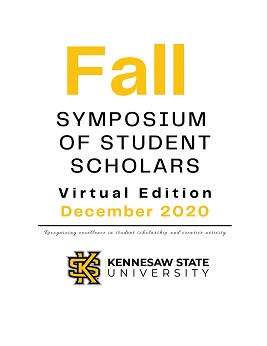Geography and Anthropology students share research at Fall Symposium of Student Scholars

KENNESAW, Ga. (Dec 4, 2020) — Several geography and anthropology students recently shared their undergraduate research yesterday at the Kennesaw State University Fall Symposium of Student Scholars, Virtual Edition, hosted by the Office of Undergraduate Research.
Morgan Bendzinski presented a project entitled "A Synchronic Comparison of Linear Enamel Hypoplasia from Byzantine Crete" (Faculty Mentor: Dr. Susan Kirkpatrick Smith). Abstract: "Analyzing human dentition is useful in reconstructing past health patterns. Linear Enamel Hypoplasia (LEH) is a dental trait that tells biological anthropologists about patterns of stress in individuals. LEH are visible horizontal lines on teeth where the enamel stopped growing during a period of stress such as malnutrition or disease. Comparing frequencies of LEH between sites can demonstrate variation in stress episodes. In this study compared dentition from Chryssi to five other Cretan sites all which date to the Byzantine period (6-12th centuries AD). Chryssi had a significantly higher frequency of LEH than four out of the five sites it was compared to. This suggests that Chryssi experienced more or more severe stress episodes than most of the other Cretan populations during the same period. This is possibly due to the socioeconomic status of individuals, in addition to disease and malnutrition. Analyzing LEH tells us how much stress these individuals endured and in what form the stress occurred. Furthermore, it allows biological anthropologists to understand patterns of stress in individuals and whole populations during the Byzantine period."
Ariel Owens and Daisy McGrath presented a project entitled "Detecting Bacterial Species from Next Generation Sequencing Data Derived from Ancient Human Skeletal Samples" (Faculty Mentor: Dr. Tsai-Tien Tseng). Their presentation won the prize for "First Runner-Up, Undergraduate." Abstract: "This study aims to isolate and identify bacteria and single nucleotide polymorphisms (SNPs) found alongside Mycobacterium tuberculosis complex (MTCB) in silico. MTCB is a causative agent of tuberculosis (TB). Our secondary objective is to examine variations of TB, study its paleoepidemiology, and apply this information to present-day public health issues. This research utilized data from the Sequence Read Archive (SRA), number PRJNA422903. This dataset is comprised of DNA obtained from the remains of 28 individuals belonging to Neolithic-period populations. This DNA is being studied in silico through next generation sequencing (NGS), utilizing the following bioinformatics software tools with customized setting: Trim Galore! and Kraken2. We plan to implement a bioinformatics pipeline to pass further fastQ files through trimming with deprivation of the adapter sequence, and Kraken2 will act as a filter allowing us to find unknown pieces of DNA sequences. Using NGS, we will be able to isolate and identify bacteria found alongside MTCB in silico to study the paleoepidemiology of TB prior to the usage of antibiotics. Due to advancements in technology, we will be able to identify more bacterial species and SNPs alongside MTBC than previous scholars in the field of paleoepidemiology. In conclusion, this approach broadens the potential scope of paleoepidemiology both to older, sub optimally preserved samples and to pathogens with difficult intrageneric taxonomy. These approaches could also be utilized in future disease diagnosis and control."
Artis Trice presented a project entitled "Urban Food Policy, Planning, and Security: A Location Analysis and Potential Impacts of Creating Community Gardens in DeKalb County, GA" (Faculty Mentor: Dr. Paul N. McDaniel). Abstract: "As food insecurity grows in complexity, the methods used to combat it must also evolve. In the Atlanta metropolitan area, direct community engagement and partnerships have led to the creation of small community garden and urban agriculture operations on public lands. However, food insecurity continues to be a problem, particularly in low-income areas where resources are fewer, such as areas within DeKalb County, Georgia. This project seeks to understand ways in which integrating food policy and planning into existing green infrastructure can mitigate issues related to food insecurity in DeKalb County and considers the following questions: How can food policy and urban agriculture center the needs of diverse populations living in suburban areas in DeKalb County? How can local government and non-profits utilize existing resources to address food insecurity? How might location-allocation be used to identify sites best suited for urban agriculture and community gardens? The research occurs in two parts: literature content analysis of the environmental and social impacts that urban community gardens have on cities and metro areas, highlighting coordinated food policy and governance surrounding such gardens, and a GIS location analysis of the parks and greenspaces in DeKalb County to assess the potential for community gardens. GIS location analysis will yield the spaces most suited to support small-scale community agriculture projects."
According to the Office of Undergraduate Research, "The Symposium of Student Scholars is an event to showcase student scholarship conducted at KSU during the past academic year. In previous years, we have had a great deal of disciplinary diversity in projects presented, including readings of new works from authors, performances of new compositions from musicians, explanations of curricular innovations from educators, innovative business models from entrepreneurs, urban landscape analyses from geographers, and a wide variety of scientific research papers."











